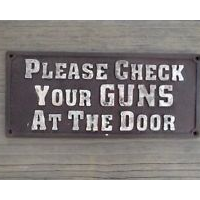Smith & Wesson Holsters Its Handguns; Won’t Comply with California’s “Microstamp” Law

Smith & Wesson said it will not comply with California’s new gun control law that requires “microstamping” of semi-automatic pistols and will, therefore, have to halt sales of the weapons in the state.
The 2007 legislation, passed when Arnold Schwarzenegger was governor, didn’t take effect until May 2013 when the technology addressed in the bill became widely available. Microstamping puts an indelible mark on bullets that are identifiable when fired, a feature that law enforcement agencies support.
Smith & Wesson doesn’t microstamp (pdf). “A number of studies have indicated that microstamping is unreliable, serves no safety purpose, is cost prohibitive and, most importantly, is not proven to aid in preventing or solving crimes,” the company said on its website. It is joined in that sentiment by many in the armed community.
The National Shooting Sports Foundation and the Sporting Arms and Ammunition Manufacturers Institute filed a lawsuit (pdf) January 9 in Fresno County Superior Court of California seeking to invalidate the law because microstamping does not “legibly, reliably, repeatedly, consistently and effectively” work.
Microstamping uses lasers to make microscopic engravings on the breech face and firing pin of a gun. A code identifying the weapon's serial number is stamped onto the cartridge when a gun is fired, enabling police to trace a gun without actually recovering it.
Los Angeles City Attorney Mike Feuer, who as a state assemblyman introduced the law, told the Orange County Register the Smith & Wesson action was “an outrageous, last-ditch effort by the gun lobby and its allies to try and thwart a law broadly supported by law enforcement to effectively prosecute gun crimes.”
A state Senate staff analysis of the legislation cited a claim by NanoMark Technologies that microstamping will eliminate the need for “extensive cross-jurisdictional ballistic image databases or a national ballistic image database containing the files of new guns sold every year.” And they say it works: “The ID marks delivered by Ballistic ID Tagging can be simply viewed by utilizing imaging equipment commonly found at local, state and federal forensics laboratories.”
The state maintains a list of guns (pdf) that have been decertified for failure to meet the requirements of California law. As certification for various models of Smith & Wesson guns expires or the weapons are updated and refined, a common occurrence, they will face new state scrutiny and fall off the list. Smith & Wesson does not make known how many guns it sells in individual states but around 300 of its models already approved by the state are scheduled to expire this year.
The gun company is leaving a red hot market. Handgun sales hit a record 388,006 in 2012.
–Ken Broder
To Learn More:
Smith & Wesson to Halt California Sales of New Semi-Auto Pistols (by Jon Ortiz, Sacramento Bee)
Smith & Wesson Threatens to Halt State Handgun Sales over "Microstamping" Law (by David Montero, Orange County Register)
Smith & Wesson Says It Won't Follow California “Microstamping” Law (by Kate Mather, Los Angeles Times)
California Microstamp Legislation (Smith & Wesson) (pdf)
National Shooting Sports Foundation and the Sporting Arms and Ammunition Manufacturers Institute, Inc. v. State of California (Fresno County Superior Court of California) (pdf)
- Top Stories
- Controversies
- Where is the Money Going?
- California and the Nation
- Appointments and Resignations
- Unusual News
- Latest News
- California Forbids U.S. Immigration Agents from Pretending to be Police
- California Lawmakers Urged to Strip “Self-Dealing” Tax Board of Its Duties
- Big Oil’s Grip on California
- Santa Cruz Police See Homeland Security Betrayal in Use of Gang Roundup as Cover for Immigration Raid
- Oil Companies Face Deadline to Stop Polluting California Groundwater





